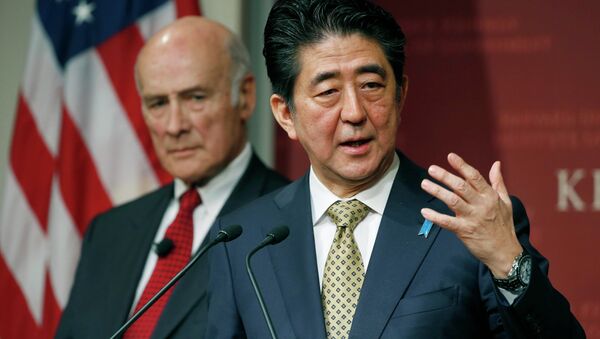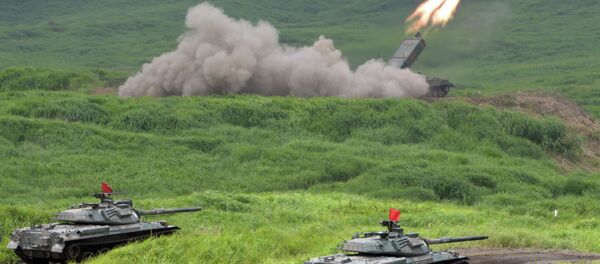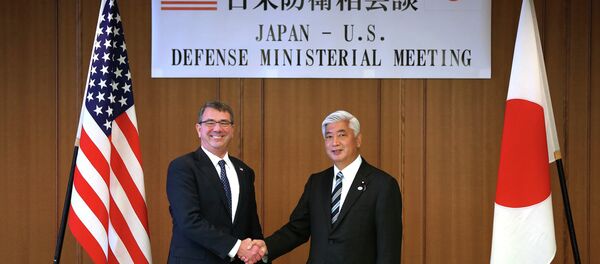A new agreement with the United States, unveiled Monday at the start of Abe's week-long visit to the US, also sets the stage for a resurgence of Japan's military influence in the region. The perception of threats on the Korean peninsula and from China — particularly in the territorial dispute over the Senkaku Islands — has energized a push to re-militarize the country.
The Liberal Democratic Party (LDP), of which Abe is the head, in particular wants to address Article 9 — the section of the constitution which essentially forbade post-WWII Japan from maintaining a military capable of waging war overseas.
Though Abe has already reversed the ban on Japan's military from fighting overseas, the LDP says that a revival of the Japanese military has gone as far as it can go without directly addressing the constitution and Article 9.
"The cabinet resolution and legislation being crafted now have gone right up to the limits of what is possible under the constitution as it is now," said Hajime Funada, who is leading an LDP panel on constitutional revision.
"If we want to have more flexibility, it is necessary to revise Article 9," he told Reuters.
Is Article 9 Untouchable?
The "pacifist constitution" as it is sometimes called, was drafted by the US after the defeat of Imperial Japan and its Axis allies, Nazi Germany and Mussolini's Italy. In place of having its own military with war-waging potential, Japan was meant to rely on the US military against external threats and an internal police force.
However, the reading of Article 9 was later broadened to allow for the Japanese Self-Defense Forces (SDF) to tackle internal threats and natural disasters. Under Abe, the SDF began participating in peacekeeping operations overseas, marking a major shift in the interpretation of the law. And some conservatives in Japan would like to redraft the constitution, without such heavy influence of other nations, simply as a point of pride.
The constitution has never been amended, however, and a proposed revision must garner a two-thirds majority in both the upper and lower houses of parliament, and a majority of voters' support in a nation-wide referendum.
Abe's LDP has a two-thirds majority in the lower house, where there is not another election set until 2018. The LDP has less support in the upper house, which will see elections in 2016, so they will have to find some support among opposition members.
Funada explained that the next three years look like the best chance the LDP may get at securing such a revision, but that they would have to start with small changes to get the Japanese people accustomed to the idea that the constitution is not immutable.
"During that period if possible, we want to revise the constitution including Article 9," he said.
New Policy Nudges Japan Towards Greater Regional Influence
Meanwhile, the agreement reached with the US during Abe's visit this week — called the Joint Defense Guidelines — remove any geographic limits on the operation of Japan's military overseas, whether for peacekeeping, emergency relief or defense missions, as long as parliament approves.
"Today, we mark the establishment of Japan’s capacity to defend not just its own territory but also the US and other partners as needed," said US secretary of State John Kerry, speaking about the guideline in New York with US and Japanese officials. "The guidelines…will enhance Japan’s security, deter threats and contribute to regional peace and stability."
To coordinate US-Japan military efforts, the guidelines create a mechanism comprising officials from both countries’ diplomatic ranks and defense departments.
"In peacetime and also in emergency situations between Japan and the United States, consultations will take place under this mechanism," said Gen Nakatani, the Japanese minister of defense.
Though some details are still being finalized, some of the areas that will see greater cooperation between the US and Japan are missile defense, minesweeping, and cyber and reconnaissance activities.
Further clarification of expanded activities will come as parliament debates the proposed changes to the constitution.
In a significant step, Japan will also be able to come to the aid of the US' military allies if needed, not just to the US itself, if Japan's security is affected.






